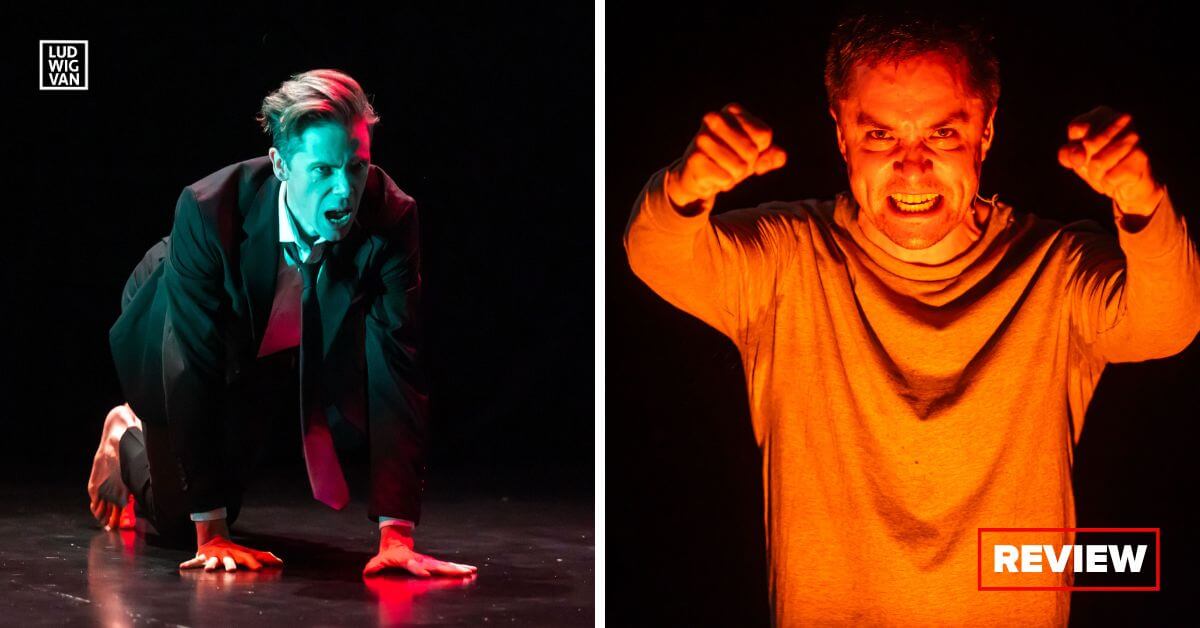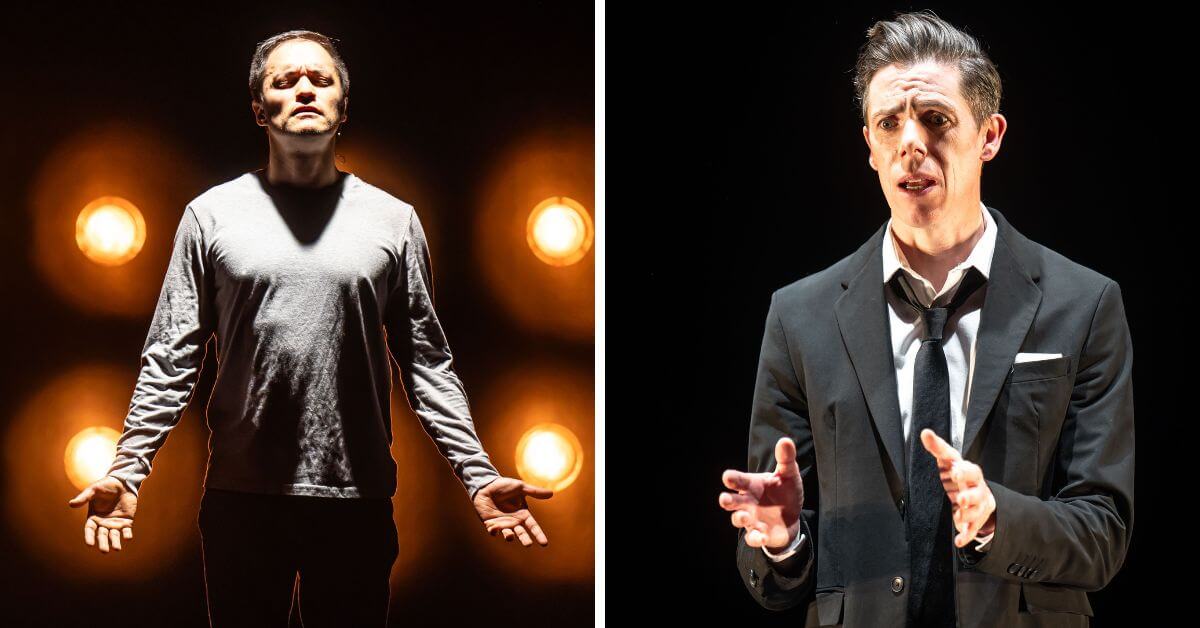
Factory Theatre/Daniel MacIvor Double Bill, Here Lies Henry, directed by Tawiah M’Carthy (Factory Upstairs), and Monster, directed by Soheil Parsa, (Factory Studio), until Dec. 17. Tickets here.
Well-known curator and dramaturge Mel Hague became artistic director of Factory Theatre just last year, and the lady is off to a flying start.
In an inspired feat of programming, she has scheduled two of Daniel MacIvor’s famous solo shows to run at the same time, Here Lies Henry upstairs, and Monster downstairs. In fact, the performances when you can see both plays in one day, matinée and evening, are selling out.
What can we say about MacIvor as a playwright, except that he is a national treasure with an international reputation? He also gained great recognition as an actor, performing in his own works, and it is the plays he created with the late great Daniel Brooks as his dramaturge and director that catapulted both MacIvor and Brooks into the Canadian theatre stratosphere.
I remember the shock in 2007 when MacIvor shut down his da da kamera company to move on to other projects. That meant no more MacIvor in his own one-man shows. Thankfully, we have Hague to resurrect the playwright.
For this double bill, she selected the last two of the so-called Monster Trilogy, the first being House (1992), followed by Here Lies Henry (1995) and Monster (1998). Hague also cleverly opted for two completely different productions, including separate actors, directors and designers. Thus, each play is treated as a unified whole.
MacIvor plays are not easy. His text swirls in eddies and fissures complicating the main story line. He expects the audience to connect the dots, which at times is hard to do, given the tangential nature of the material. Elliptical, opaque, and at times, obscure, it is MacIvor as a puzzle-maker that renders him such an intriguing playwright. (As a side note, MacIvor has clearly updated the texts to be au current with references to Trump, et cetera.)
So let’s meet Henry (Damien Atkins) and Adam (Karl Ang), and I’d like to add here that the casting for each play is perfection.

Henry comes out on stage from a crack in the curtain, in a sea of blinding light. He is awkward, nervous and nerdy as he explains to us that he’s been compelled to reveal something that we don’t already know. He then proceeds to give us intimate details about his life. He claims to be an optimist, a cosmetics salesman, and a homosexual, but he also reports that he is a self-proclaimed liar, so what are we to believe? He also alludes to some dark undercurrent beneath his biographical detail, and every time he mentions his father, he involuntarily makes a strangled sound. As his memories play snakes and ladders, flying in all direction, we begin to gather the picture of a man who was one of life’s outsiders. He is a mass of contradictions, although the hapless Henry does make for an endearing character, and don’t forget, there is a body in another room.
Adam, on the other hand, from the start sets a chilling tone. It begins in the darkness of a movie theatre, with someone telling the assholes to shut up, and then moves into Adam’s monologue. He begins by describing with relish a terrible crime that apparently happened next door, where a son savagely killed and dismembered his father. We also meet the characters of Al and Janine, a bickering couple, with the woman always getting her nagging way. There is also an alcoholic filmmaker named Joe whose idea about making a movie about this crime was stolen by someone else. Adam seems to delight in darkness, gleefully spewing out graphic details about addiction, abuse and murder. In all, the actor plays 16 different characters, but what the audience doesn’t know, are the time periods. What is the order of the events being told?
Is the purpose of Henry’s ramblings to point out the meaninglessness of life? Is Adam’s raison d’être to present an overlapping storyline that is designed to shock and dismay? The witty scripts play fast and loose with repetitions and abrupt changes of direction, in a highly poetic style with particularly florid images. When it comes to language, MacIvor is a master.
The sound effects that punctuate both scripts are monumentally important, and have to be perfectly timed. Kudos to Olivia Wheeler (Henry) and Thomas Ryder Payne (Monster) for their superior work. Similarly, Andre Du Toit (Henry) and Trevor Schwellnus (Monster) deserve accolades for their intense lighting changes.
As Henry, Atkins presents a bumbling character, but there is a slyness about him. What joke is he playing on us? It’s an intriguing, double-edged portrayal, wanting our sympathy, yet underlining his vulnerability with a cold hardness. Ang as Adam, on the other hand, is pure evil, with wild eyes and combative demeanour. He doesn’t care what we think of him. It is a marvellous portrait of defiance on steroids.
As for the directors, Tawiah M’Carthy (Henry), and Soheil Parsa (Monster), it is abundantly clear that exact detailing was put into every word each actor utters, just as the lighting and sound were layered in with precision. Both productions really make you concentrate on the delivery of the text. As well, the meticulous use of physicality was also evident. In short, both productions were very, very carefully crafted.
And now I’m going to go out on a limb. No one ever really says what a MacIvor solo show is specifically about because they are complex vehicles of great sophistication. I, however, rightly or wrongly, am going to call it.
I see Here Lies Henry as a life flashing before the character’s eyes on the point of his death, hence the intense white light. I believe he is the body in the other room, and he may or may not have been murdered.
As for Monster, for me it is the making of a killer, and Adam is that killer. The alcoholic Al and obtuse Janine are his parents. The movie is a red herring, but Adam delights that his crime has a bigger audience.
Once again, congratulation to Factory artistic director Mel Hague for this inspired MacIvor Double Bill.
Are you looking to promote an event? Have a news tip? Need to know the best events happening this weekend? Send us a note.
#LUDWIGVAN
Get the daily arts news straight to your inbox.
Sign up for the Ludwig Van Toronto e-Blast! — local classical music and opera news straight to your inbox HERE.
- INTERVIEW | Actor Diego Matamoros Takes On Icon Walt Disney In Soulpepper Production Of Hnath Play - April 16, 2024
- SCRUTINY | Opera In Concert Shine A Light On Verdi’s Seldom Heard La Battaglia Di Legnano - April 9, 2024
- SCRUTINY | Lepage & Côté’s Hamlet Dazzles With Dance And Stagecraft Without Saying Anything New - April 5, 2024



